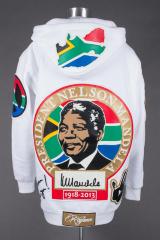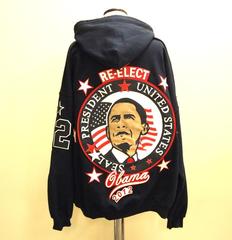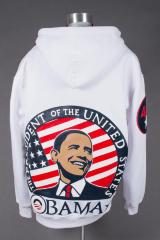Comments and Tags
Be the first to comment on this item!
Clothing and Accessories
Black History ➔ Sweatshirt
Identifier:
2019.9.47Description:
Oversized pink cotton hooded sweatshirt. Applied on the back is the face of Rosa Parks made of different colors of hand-cut and hand-sewn leather and a collage of other different images of Parks printed onto leather. The garment was created and designed by local artist, Reginald James. James is known for his modern creative shirt designs of significant historic figures. The Grand Rapids Public Museum has a collection of other sweatshirts he's designed representing President Barack Obama and Nelson Mandela.December 1, 2020, will mark the 65th anniversary of Rosa Parks' refusal to give up her seat on the bus to a white passenger. This sweatshirt, by a Grand Rapids artist, commemorates her courageous work as an American activist in the civil rights movement.
Date:
2019Materials:
Cotton, LeatherCurrent Location Status:
Museum School ProgramCollection Tier:
Tier 3Source:
Museum PurchaseRelated Entities:
Reginald James (creator)Reginald James, owner of RegJames Klothing Company, is an artist, designer, and sewing and design instructor from Grand Rapids, Michigan. His designs originally featured Black leaders such as Nelson Mandela and Rosa Parks but in the wake of George Floyd's murder in 2020, he began designing clothing in support of Black victims of violence such as Breonna Taylor and Patrick Lyoya. Rosa Parks (is related to)
Rosa Louise McCauley Parks (February 4, 1913 – October 24, 2005) was an American activist in the civil rights movement best known for her pivotal role in the Montgomery bus boycott. The United States Congress has called her "the first lady of civil rights" and "the mother of the freedom movement".
On December 1, 1955, in Montgomery, Alabama, Parks rejected bus driver James F. Blake's order to relinquish her seat in the "colored section" to a white passenger, after the whites-only section was filled. Parks was not the first person to resist bus segregation, but the National Association for the Advancement of Colored People (NAACP) believed that she was the best candidate for seeing through a court challenge after her arrest for civil disobedience in violating Alabama segregation laws. Parks' prominence in the community and her willingness to become a controversial figure inspired the black community to boycott the Montgomery buses for over a year, the first major direct action campaign of the post-war civil rights movement. Her case became bogged down in the state courts, but the federal Montgomery bus lawsuit Browder v. Gayle succeeded in November 1956.
Source: Wikipedia


